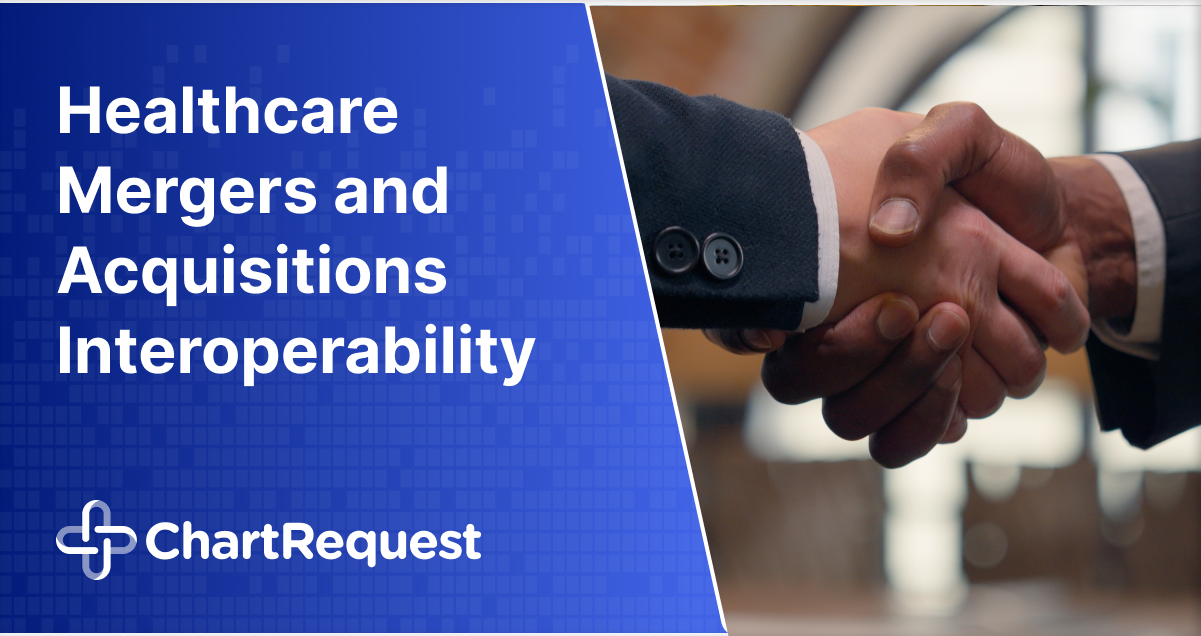Healthcare mergers and acquisitions (M&A) are transforming patient care, but the path to seamless interoperability is never smooth.
Merging your practice requires you to align care coordination strategies without missing a beat. A single misstep in data migration can cause inefficiencies, delays, and compromise patient treatment.
Schedule a free consultation today to see how we streamline medical record migration.
Sharing Medical Records During Healthcare Mergers and Acquisitions
Medical records are indispensable for providing quality, safe, and efficient healthcare services. However, interoperability remains a major obstacle to sharing and accessing patient information effectively during business transitions.
Your healthcare mergers and acquisitions could face data exchange challenges due to various factors, including:
Incompatible EHR Systems
Two healthcare systems may depend on different electronic health record (EHR) systems before they merge. Disjointed systems may result in fragmented data transfers.
Gartner reports that 83% of data migration projects fail, and over 50% go over budget and behind schedule due to this problem.
Data Migration Issues
Moving vast amounts of patient data between systems during healthcare mergers and acquisitions increases the risk of data loss, duplication, and corruption.
Hospitals produce around 50 petabytes of data each year — approximately 137 terabytes daily on average. Migrating such a large volume of data without errors is daunting, and a single mistake can create setbacks for records retrieval.
HIPAA Compliance
Compliance with regulatory standards, like the Health Insurance Portability and Accountability Act (HIPAA), adds to the complexity of mergers and acquisitions. During healthcare M&A, you must ensure that all data transfers are secure and meet the latest privacy requirements.
Mishandling any protected health information (PHI) identifiers can lead to dire financial penalties for your organization.
For instance, Anthem Inc. settled a $16 million HIPAA fine in 2018 after compliance failures. It is the highest penalty ever given to a healthcare organization.
Time and Resource Constraints
Integrating multiple EHR systems during healthcare mergers and acquisitions requires a significant investment in technology, expertise, and personnel. Without adequate resources, delays and inefficiencies might become unavoidable.
Implementing a new EHR system can be expensive, with costs reaching up to $162,000 for a five-physician practice. Choosing a reliable third-party service to bridge the gap — like ChartRequest — can save your organization thousands.
Benefits of Addressing Interoperability During Healthcare Mergers and Acquisitions
Failing to tackle interoperability can lead to communication issues among collaborative healthcare providers. These breakdowns can compromise patient safety when critical health information is not readily available. Malpractice lawsuits are increasing, with 41 states granting over $10 million to victims in the past six years.
Here are the benefits of minimizing interoperability challenges in your organization:
- Ensure seamless patient care without delays or data gaps.
- Boost operational efficiency by reducing manual data entry and retrieval.
- Protect your organization from legal risks and compliance violations.
- Avoid costly data migration failures.
- Enhance patient satisfaction through timely and coordinated care.
- Safeguard sensitive health information during and after mergers.
- Maintain trust by preventing data breaches and security issues.
- Enable smoother transitions and faster post-merger integration.
ChartRequest Can Support Your M&A Success
Interoperability solutions are essential for the success of healthcare mergers and acquisitions.
However, some strategies may be complex, costly, or inefficient. ChartRequest offers a streamlined platform to reduce disruptions and ensure secure data exchange during M&A activities.
ChartRequest is an EMR-agnostic platform, meaning we work with every electronic record system for easy integration during healthcare mergers and acquisitions.
Leveraging ChartRequest helps minimize the risks of data fragmentation and ensures a smooth transition for your organization. It provides a streamlined approach to medical record exchange, helping you stay ahead in the complex demands of healthcare mergers and acquisitions.
Contact us to learn how ChartRequest can simplify your post-M&A data migration.


